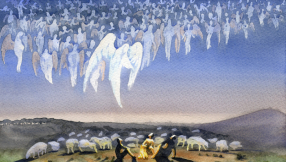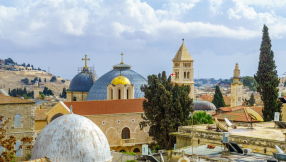The United States and Russia reached a breakthrough deal early on Saturday to try to restore peace in Syria, but air strikes hours later on a busy market place that killed and injured dozens added to rebels' doubts that any ceasefire could hold.
The agreement, by the powers that back opposing sides in the five-year-old war, promises a nationwide truce from sundown on Monday, improved access for humanitarian aid and joint military targeting of hardline Islamist groups.
But hours after it was agreed, warplanes bombed a marketplace in rebel-held Idlib in northwestern Syria, killing at least 58 civilians, many children and women, according to rescue workers and the Britain-based Syrian Observatory for Human Rights. Locals said they believed the jets to be Russian.
Videos of footage on social media showed rescuers carrying the corpses of a charred child and other victims as other civil defence workers pulled mangled bodies from beneath rubble.
"The market was full of shoppers going to buy presents for their kids, they were all civilians," said Salem Idlibi, a civil defence worker saying the market was unusually busy ahead of a major Muslim feast on Monday.
Idlib province has endured escalating strikes by Russian planes in recent months, according to international aid workers and residents, destroying scores of hospitals, bakeries and other infrastructure across rebel-held territory.
Aleppo was also hit from the air and fighting continued on the ground on Saturday. The army attacked rebel-held areas, both sides said, pushing to maximise gains before the ceasefire deadline.
Thirty people were killed by barrel bombs dropped by army helicopters on the besieged rebel-held east of the city, and jets, either Syrian or Russian, bombed rebel-held towns along important insurgent supply routes.
Insurgents said they were planning a counter-offensive.
"The fighting is flaring on all the fronts of southern Aleppo," rebel spokesman Captain Abdul Salam Abdul Razak said.
Razak, of the Nour al-Din al Zinki Brigades, part of the Free Syrian Army (FSA) which is backed by the West, said they were studying the peace deal but feared it merely gave the Syrian army a chance to gather forces and pour more Iranian-backed militias into Aleppo.
President Bashar al Assad's government made no comment on the peace deal, but Syrian state media quoted what it called private sources as saying the government had given its approval.
Syria's mainstream political opposition, the Riyadh-based High Negotiations Committee (HNC), said it had not received a copy of the deal and would only react after consulting members.
A spokeswoman had earlier welcomed any deal that spared civilian lives but cast doubt on whether Moscow would be able to pressure Damascus to stop indiscriminate bombing.
In a sign of the multi-sided conflict, Israeli aircraft attacked a Syrian artillery post near the occupied Golan Heights on Saturday.
The Israeli military said it was retaliation for a shell fired from Syria that had landed inside the Israeli-controlled Golan Heights. Syrian state television accused Israel of seeking to help an offensive by hardline Islamist rebels.
A number of Islamist and FSA brigades earlier announced they had launched a battle in the province of Quneitra, which borders the Golan region, with the aim of opening a rebel corridor to the western suburbs of Damascus.
U.S. Secretary of State John Kerry called on all sides to respect the deal, which was finally reached after several failed attempts over recent weeks.
"This requires halting all attacks, including aerial bombardments, and any attempts to gain additional territory at the expense of the parties to the cessation. It requires unimpeded and sustained humanitarian access to all of the besieged and hard-to-reach areas including Aleppo," he said.
Russian Foreign Minister Sergei Lavrov said that despite continuing mistrust, the two sides had developed five documents that would enable coordination of the fight against terrorism and a revival of Syria's failed truce.
Both sides agreed not to release the documents publicly.
"This all creates the necessary conditions for resumption of the political process, which has been stalling for a long time," Lavrov said.
Previous peace efforts have crumbled within weeks, with the United States accusing Assad's forces of attacking opposition groups and civilians.
Kerry said the "bedrock" of the new deal was an agreement that the Syrian government would not fly combat missions in an agreed area on the pretext of hunting fighters from the Nusra Front, an al-Qaeda affiliate in Syria which has recently changed its name to Jabhat Fateh al-Sham.
Under the new deal, both sides - Russian-backed government forces and rebel groups supported by the U.S. and Gulf states - are to halt fighting as a confidence-building measure.
Cooperation with Fateh al-Sham could bring "dire consequences" for Syria's mainstream rebel groups once the proposed deal comes into effect, Washington's envoy to Syria said on Saturday.
In a letter to armed opposition groups seen by Reuters, Michael Ratney urged them to abide by the U.S.-Russian deal, saying it gave them the right of self-defence against attacks by the Syrian army and Russia.
He said the deal would end aerial bombardment by Russia and the Syrian air force of their positions and of civilians living in areas they control.
If the truce holds from Monday, Russia and the United States will begin seven days of preparatory work to set up a "joint implementation centre", where they will share information to distinguish territory controlled by Nusra from that held by other rebel groups.
For many FSA rebels, the idea of a clear separation from Nusra is problematic because on several fronts they fight together against the army and allied Iranian-backed militias.
Fateh al-Sham has also played a major role in trying to end the siege of eastern Aleppo which many rebels say has boosted its popularity, and discussions are ongoing to possibly unify ranks under a broader opposition army.
"Fateh al-Sham is a faction present on the ground and it takes part in most of the military operations, and the matter of separating it is not possible, particularly given that there are attempts to merge, within some factions, with Fateh al-Sham," Fares al-Bayoush, head of an FSA group called the Northern Division, told Reuters.













